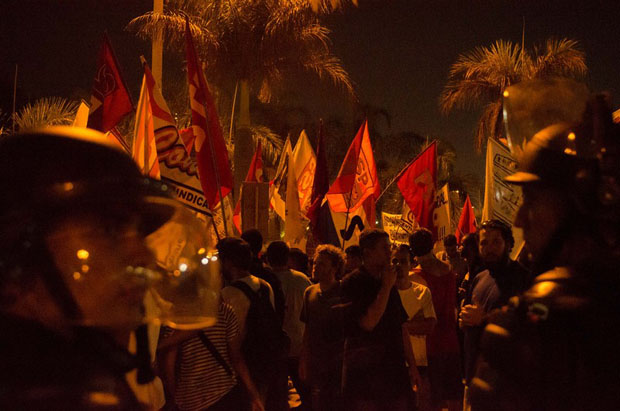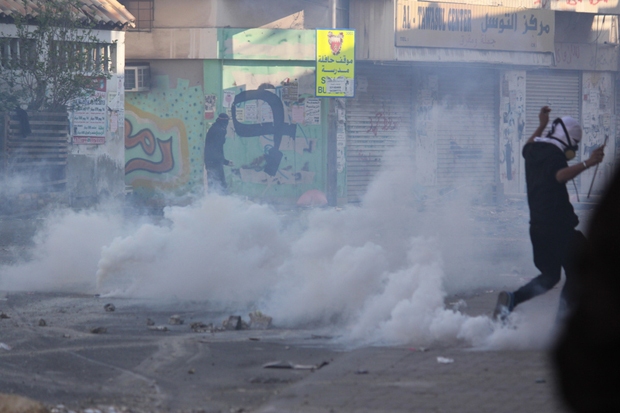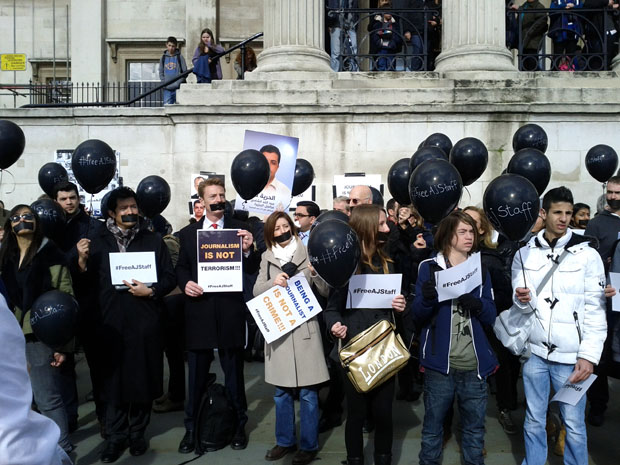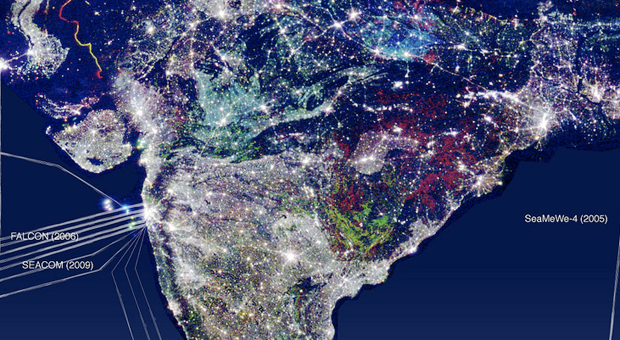12 Jun 2014 | Azerbaijan, Azerbaijan News, Bahrain, Brazil, China, Draw the Line, Russia

Protests against increase in public transportation costs in Rio de Janeiro on 13 February (Image: Mauricio Fidalgo/Demotix)
The World Cup — arguably the biggest international event on the planet — is upon us once more. But in the past year, Brazilians have been using their rights to free expression to organise large-scale protests to show their dissatisfaction with hosting the tournament. Meanwhile, revelations of serious human rights violations and corruption related to 2022 host Qatar have emerged. This year, human rights are sharing the spotlight with the beautiful game and its stars.
This isn’t the first time politics and sports have mixed. Just think of the Formula 1 Grand Prix races hosted in Gulf kingdom Bahrain, where authorities have cracked down on pro-democracy protesters; or the 2008 Olympics organised by the Chinese communist regime, which employs two million people to help monitor web activity; or the 1978 World Cup held in then-military dictatorship Argentina. More recently, Vladimir Putin’s Russia hosted the Winter Olympics (and will host the 2018 World Cup) not long after implementing homophobic legislation targeting so-called “gay propaganda”, while Belarus, which has been ruled by dictator Alexander Lukashenko since 1994, organised the 2014 Ice Hockey World Championship. Azerbaijan, with its, according to the latest figures, 142 political prisoners, is playing host to the inaugural European Games in 2015.
That’s without even considering the many human rights abuses perpetrated by authorities in participating countries.
The question that often comes up when these huge, prestigious events roll around, is how do we respond to the countries that repress their citizen’s free expression? Should we boycott? Should we use the attention to raise our voice on human rights abuses? Should we engage or ignore? Get involved the discussion using the hashtag #IndexDrawtheLine and tell us — where do you draw the line?
This article was published on June 12, 2014 at indexoncensorship.org
9 May 2014 | Azerbaijan, Azerbaijan News, Bahrain, China, News and features, Oman, Saudi Arabia, Thailand, United Arab Emirates, United Kingdom

Made in Britain? Physicians for Human Rights (PHR) called for the immediate suspension of the use of excessive, indiscriminate and systematic use of tear gas against civilian protesters and densely populated Shia neighbourhoods in Bahrain (Image: Iman Redha/Demotix)
The Arab Spring has not stopped Britain from helping crush free expression and freedom of assembly by selling crowd control gear to authoritarian states including Saudi Arabia and Bahrain.
Analysis of newly-published data on export licences approved by the UK government have revealed ministers backed over £4 million of tear gas, crowd control ammunition and CS hand grenade sales over the last two years to Saudi Arabia – one of the most repressive states in the world.
The British government also allowed crowd control ammunition to be sold to Malaysia and Oman, as well as tear gas to Hong Kong and Thailand.
It gave the green light to anti-riot and ballistic shields to four authoritarian regimes listed by the Economist Democratic Index: the United Arab Emirates, Bahrain and Azerbaijan, as well as Saudi Arabia.
Its only refusal for an export licence in 2013 for equipment which could be used to suppress internal dissent was for an order of CS hand grenades and ‘tear gas/irritant ammunition’ to Turkey.
A lack of transparency across the secretive arms sector makes it difficult to establish which companies are providing the arms – or how the country in question intends to use them.
But the Geneva Convention forbids the military use of all gas weapons, meaning the UK government would have assumed the tear gas was for use against civilian protesters.
Brief explanatory notes included in the export licences data suggest all those mentioned above are primarily for use against domestic populations.
The notes typically state the licence is granted “for armed forces end use” or “for testing and evaluation by a government / military end user”.
The only exception is the note for a sizeable order of anti-protest equipment for Brazil, which makes clear the export licence is granted for “armed forces end users not involved in crowd control / public security”.
Further evidence has emerged that Britain’s leading arms firm, BAE, has signed a £360 million contract with an unnamed Middle Eastern country for the upgrade of armoured personnel carriers whose primary use is against protesters.
Industry insiders believe the improvements are being made in Saudi Arabia to a stockpile of the vehicles left in the country by the United States military.
BAE’s chairman Sir Roger Carr said contractual commitments prevented him from commenting at the defence giant’s annual general meeting in Farnborough yesterday.
He faced heckling and hissing from vocal critics in the audience who had infiltrated the two-hour question-and-answer session, but insisted BAE was “helping to preserve world peace” and that the company “are not undermining the broader international rules” of the arms trade.
Speaking afterwards, however, a member of BAE’s board suggested the “natural place for these decisions is with government” rather than the company.
“I’m not abrogating our moral responsibility,” he said, “but it’s right that the burden of these difficult decisions is on the government because, in the UK at least, this is an elected democracy.”
Britain’s parliament, at least, has proved reluctant to provide a critical voice on the UK’s arms trade.
Opponents had alleged Saudi Arabian troops which intervened to crush the Arab Spring in Bahrain had received British military training. A recent report from MPs accepted the Foreign Office’s rejection of British complicity, with ministers arguing none of the training had taken place “in a repressive way”.
The Commons’ foreign affairs committee did, however, call on the government to “adhere strictly to its existing policy to ensure that defence equipment sold by UK firms are not used for human rights abuses or internal repression”.
Its request for the government to provide further evidence that it is doing so in practice did not meet with a positive response.
Officials said the risk that export licence criteria might be broken is “factored into” the original decision to grant the licence.
The Foreign Office stated: “There are rigorous pre-licence checks and, for open licences, compliance audits at the exporters’ premises in the UK. We will continue to scrutinise carefully all arms sales to Saudi Arabia.”
Many believe the current export licence regime is not fit for purpose, however. In 2013 the UK approved military licences to a total of 31 authoritarian regimes including Russia, China, Qatar and Kuwait.
“BAE couldn’t sell the weapons they do to these countries without the support of the UK government,” Andrew Smith of the Campaign Against The Arms Trade said.
“The UK government can stop any of these exports at any time but is choosing not to because it’s putting arms company profits ahead of human rights.”
He suggested the government’s decision to exclude Bahrain from its list of ‘countries of concern’ on human rights was “politically motivated”.
And he warned arms sales went beyond small-scale arms and ammunition to include much bigger purchases like fighter jets.
“The reason the Saudis buy from Britain is not just because Britain is willing to sell arms,” Smith added, “but also because it comes with political support and the endorsement and silence of the British government.”
This article was posted on May 9, 2014 at indexoncensorship.org
2 May 2014 | News and features

A London protest calling for the release of jailed Al Jazeera journalists in Egypt (Image: Index on Censorship)
Press freedom is at a decade low. Considering just a handful of the events of the past year — from Russian crackdowns on independent media and imprisoned journalists in Egypt, to press in Ukraine being attacked with impunity and government reactions to reporting on mass surveillance in the UK — it is not surprising that Freedom House have come to this conclusion in the latest edition of their annual press freedom report. This serves as a stark reminder that press freedom is a right we need to work continuously and tirelessly to promote, uphold and protect — both to ensure the safety of journalists and to safeguard our collective right to information and ability to hold those in power to account. On the eve of World Press Freedom day, we look back at some of the threats faced by the world’s press in the last 12 months.
1) Journalism is not terrorism…
National security has been used as an excuse to crack down on the press this year. “Freedom of information is too often sacrificed to an overly broad and abusive interpretation of national security needs, marking a disturbing retreat from democratic practices,” say Reporters Without Borders (RSF) in their recently released 2014 Press Freedom Index.
Journalists have faced terrorism and national security-related accusations in places known for their somewhat chequered relationship with press freedom, including Ethiopia and Egypt. However, the US and the UK, which have long prided themselves on respecting and protecting civil liberties, have also come under criticism for using such tactics — especially in connection to the ongoing revelations of government-sponsored mass surveillance.
American authorities have gone after former NSA contractor and whistleblower Edward Snowden, tapped the phones of Associated Press staff, and demanded that journalists, like James Risen, reveal their sources. British authorities, meanwhile, detained David Miranda under the country’s Terrorism Act. Miranda is the partner of Glenn Greenwald, the journalist who broke the mass surveillance story. Authorities also raided the offices of the Guardian — a paper heavily involved in reporting in the Snowden leaks.
2) …but governments still like putting journalists in prison
The Al Jazeera journalists detained in Egypt on terrorism-related charges was one of the biggest stories on attacks on press freedom this year. However, Mohamed Fahmy, Baher Mohamed, Peter Greste and their colleagues are far from the only journalists who will spend World Press Freedom Day behind bars. The latest prison census from the Committee to Protect Journalists (CPJ) put the number of journalists in jail for doing their job at 211 — their second highest figure on record.
In Bahrain, award-winning photographer Ahmed Humaidan was sentenced in March to ten years in prison. In Uzebekistan, Muhammad Bekjanov, editor of opposition paper Erk, is serving a 19-year sentence — which was increased from 15 in 2012, just as he was due to be released. In Turkey, after waiting seven years, Fusün Erdoğan, former general manager of radio station Özgür Radyo, was last November sentenced to life in jail. Just last Friday, Ethiopian authorities arrested prominent political journalist Tesfalem Waldyes and six bloggers and activists.
3) New media is under attack…
As more journalism is being conducted online, blogs, social and other new media are increasingly being targeted in the suppression of press freedom. Almost half of the world’s jailed journalists work for online outlets, according to the CPJ. China — with its massive censorship apparatus — has continued censoring microblogging site Sina Weibo, while also turning its attention to relative newcomer WeChat. In March, it closed down several popular accounts, including that of investigative journalist Luo Changping.
Meanwhile, Turkish Prime Minister Recep Tayyip Erdoğan has publicly all but declared war on social media, at one point calling it the “worst menace to society”. Twitter played a big role in last summer’s Gezi Park protests, used by journalists and other protesters alike. Only days ago, Turkish journalist Önder Aytaç was jailed, essentially, because of the letter “k” in a Tweet.
Meanwhile Russia has seen a big crackdown on online news outlets, while legislation recently passed in the Duma is targeting blogs and social media.
4) …and independent media continues to struggle
Only one in seven people in the world live in countries with free press. In many parts of the world, mainstream media is either under tight control by the government itself or headed up media moguls with links to those in power, with dissenting voices within news organisation often being pushed out. Brazil, for instance, has been labelled “the country of 30 Berlusconis” because regional media is “weakened by their subordination to the centres of power in the country’s individual states”. At the start of the year, RIA Novosti — known for on occasion challenging Russian authorities — was liquidated and replaced by the more Kremlin-friendly Rossiya Segodnya (Russia Today), while in Montenegro, has seen efforts by the government to cut funding to critical media. This is not even mentioning countries like North Korea and Uzbekistan, languishing near the bottom of press freedom ratings, where independent journalism is all but non-existent.
5) Attacks on journalists often go unpunished
A staggering fact about the attacks on journalists around the world, is how many happen with impunity. Since 1992, 600 journalists have been killed. Most of the perpetrators of those crimes have not been brought to justice. Attacks can be orchestrated by authorities or by non-state actors, but the lack of adequate responses by those in power “fuels the cycle of violence against news providers,” says RSF. In Mexico, a country notorious for violence against the press, three journalists were murdered in 2013. By last October, the state public prosecutor’s office had yet to announce any progress in the cases of Daniel Martínez Bazaldúa, Mario Ricardo Chávez Jorge and Alberto López Bello, or disclose whether they are linked to their work. Pakistan is also an increasingly dangerous place to work as a journalist. Twenty seven of the 28 journalists killed in the past 11 years in connection with their work have been killed with impunity. Syria, with its ongoing, devastating war, is the deadliest place in the world to be a journalist, while some of the attacks on press during the conflict in Ukraine, have also taken place without perpetrators being held accountable. That attacks in the country appear to be accelerating, CPJ say is “a direct result of the impunity with which previous attacks have taken place”.
This article was published on May 2, 2014 at indexoncensorship.org
1 May 2014 | Digital Freedom, India, News and features

India was among the few governments that did not sign the NETmundial outcome statement. But why does it seem that the world’s largest democracy is not putting its weight behind a “bottom-up, open, and participatory” multistakeholder process?
In his address to the NETmundial gathering, Vinay Kwatra, the official Indian representative said, “We recognize the important role that various stakeholders play in the cyber domain, and welcome involvement of all legitimate stakeholders in the deliberative and decision making process. Internet is used for transactions of core economic, civil and defence assets at national level and in the process, countries are placing their core national security interests in this medium. Now with such expansive coverage of States’ activities through the internet, the role of the governments in the Internet governance, of course in close collaboration and consultation with other stakeholders is an imperative.”
The message was clear. The internet has a large role to play in India’s national policy goals, and to that end, a global internet governance ecosystem has to be managed, at the international level, by multilateral mechanisms.
India has over 200 million Internet users — with about 52 million subscriptions — over 900 million mobile telephone subscribers. These numbers are only going to grow. Kwatra, continuing his address, added that, “On our part, however, we would have liked to some of important principles and ideas, highlighted by us and many other countries reflected in the draft outcome document… (we) look forward to constructively engaging with other delegations in collectively contribute to making the Internet open, dynamic and secure, and its governance balanced between rights and responsibilities of all its stakeholders.” (sic)
Kwatra was speaking, of course, at NETmundial, dubbed the “world cup of internet governance.” Held in Sao Paolo, Brazil, on April 23-24, 2014, the conference was announced by Brazil President Dilma Rousseff. The entire chain of events can be traced back to the revelations by Edward Snowden that the US’s National Security Agency had been spying on its own citizens and other countries alike, including the personal communication of President Rousseff. In a heated statement at the UN General Assembly in September 2013, she called for the UN to oversee a new global legal system to govern the internet. She said such multilateral mechanisms should guarantee the “freedom of expression, privacy of the individual and respect for human rights” and the “neutrality of the network, guided only by technical and ethical criteria, rendering it inadmissible to restrict it for political, commercial, religious or any other purposes.
Soon, after a brief consultation with Fadi Chehade in October 2013, the head of ICANN — Internet Corporation for Assigned Names and Numbers – an organization thatcoordinates the Internet’s global domain name system, the dates of NETmundial was announced. And to add expectation to the event, in March 2014, the the U.S. Commerce Department’s National Telecommunications and Information Administration (NTIA) announced its intent to transition key internet domain name functions to the global multistakeholder community. It clarified that it would not hand over ICANN to any government-led body. Suddenly, NETmundial gained weight as it was to be the next international forum where the future of internet governance was to be debated – and now one of the organizations government a part of the internet was in play. A far cry from what President Rousseff had suggested in the UN General Assembly, instead of talking about an international legal regime to govern cyberspace, the focus of the meeting turned to multistakeholderism as the way forward in the sphere of internet governance.
The draft outcome statement and the subsequent final outcome state released after the two-day conference is a result of 180 input documents and 1300 comments from over 47 countries, and the work of the 1229 delegates from 97 countries who attended NETmundial. India had an official delegation as well as civil society participants who attended the meeting. In fact, an Indian academic was chosen to co-chair the organizing committee for civil society for the event. Remote participations hubs were set up in cities around the country, including Gurgaon, Chennai and Bangalore. Within the Indian contingent too, as with any large country, there are divergent views on the governance framework to be taken for the internet, with those who support the governments view for multilateralism at the international level and multistakeholderism at home, and those who oppose the official view and encourage an international multistakeholder regime.
The final statement – though non-binding – has squarely put its weight behind multistakeholderism. It talks about protecting the ‘rights that people have offline, must be protected online… in accordance with international human rights legal obligations.’ It also champions cultural and linguist diversity, which was part of India’s official submission to NETmundial. However, when the document starts to tilt towards governance structure is where it diverges from the official Indian position, with language such as – “internet governance institutions and processes should be inclusive and open to all interested stakeholders. Processes, including decision making, should be bottom-up, enabling the full involvement of all stakeholders, in a way that does not disadvantage any category of stakeholder.”
In the crucial area of cyber jurisdiction, it says, ‘It is necessary to strengthen international cooperation on topics such as jurisdiction and law enforcement assistance to promote cybersecurity and prevent cybercrime. Discussions about those frameworks should be held in a multistakeholder manner.’ On surveillance, the most controversial topic from 2013 which prompted the Netmundial meeting in the first place, the document says, ‘Mass and arbitrary surveillance undermines trust in the Internet and trust in the Internet governance ecosystem. Collection and processing of personal data by state and non-state actors should be conducted in accordance with international human rights law. More dialogue is needed on this topic at the international level using forums like the Human Rights Council and IGF aiming to develop a common understanding on all the related aspects.’
The reaction to Netmundial has been varied, depending on whom you ask. There are those who have hailed it as a first positive step towards a multistakeholder process, and are encouraged to find that participants found more things to agree on than disagree. The US called it a “huge success”. The European Commission felt Netmundial put it on the “right track.” Many big businesses released statements indicating they were pleased at the outcome. The civil society group at Netmundial expressed ‘deep disappointment’ that the outcome statement did not address key concerns like surveillance and net neutrality. Others commentators hailed it a big success for big business as it was able to ‘grab the ball on three important points: intellectual property; net neutrality; and intermediary liability’.
In a sense, India’s refusal to sign the outcome statement, and instead take back to its stakeholders seems to be completely aligned with its stated view of the internet. If, as documentation suggests, the internet is being viewed by India as not merely an open, free, global commons that should remain untouched by any major governmental control, but instead a resource that needs to reflect the values of an ‘equinet’ – a platform for commerce, e-governance, national security mechanism to be achieved through fair playing rules established by a ‘globally acceptable legal regime’ and a ‘new cyber jurisprudence’, then there is a long battle ahead. The official Indian argument does not need to be viewed through the lens that presupposes it wishes to inflict censorship in the manner that an authoritarian government might. The argument must be weighed on the merits of this line of thought – that for Indian netizens, business, and even state surveillance to survive, it must be the government who reflects the national interest in international platforms, after having consulted stakeholders back home.
It certainly seems that the weight and development of a billion people sits heavy on the shoulders of the Indian government. The question is: does it need to lead them to the world wide web, or can they find it themselves?
This article was posted on May 1, 2014 at indexoncensorship.org




